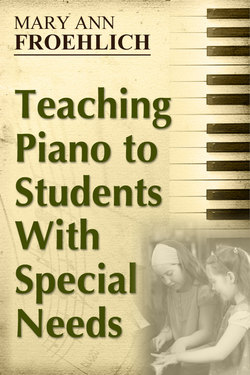Читать книгу Teaching Piano to Students With Special Needs - Mary Ann Froehlich - Страница 10
На сайте Литреса книга снята с продажи.
In summary –
ОглавлениеMusic education, specifically learning to play an instrument such as the piano, is effective because:
---Making music is the ideal neural networking experience, simultaneously connecting multiple brain sites.
---Music education is a cross-brain experience, integrating all our neurodevelopmental systems, reinforcing our strengths and improving our weaknesses. Learning to play an instrument improves fine motor skills, rhythmic awareness, eye-hand coordination, auditory skills, visual skills, the ability to translate symbols, and spatial awareness. Mastery of these skills are keys to educational success.
---Learning a complex skill requiring hours of repeated practice establishes neural pathways in a child’s brain while it is still myelinating. The white matter in the brain, enabling neuron connections, is more developed in musicians than non-musicians.
---Whether students are young or old, they can continue to develop and rebuild myelin through deep practice.
---Music making causes the brain to release chemicals which regulate mood, reduce pain, and enhance body coordination.
---Engaging in the music making process impacts the development of the brain in childhood over a long period of time. While exposure to music is valuable and important in arts education, listening to serious music is not a quick fix for improving academic skills and test scores.
---Students with special needs who are passionate about making music and committed to concentrated daily practice will make musical progress. Passion and practice are better predictors of musical success than natural ability or intelligence.
But myelin doesn’t care about who you are. It only cares about what you do.
Daniel Coyle
Knowledge is not skill. Knowledge plus 10,000 times is skill.
Shinichi Suzuki
The story of your brain on music is the story of an exquisite orchestration of brain regions, involving both the oldest and newest parts of the human brain, and regions as far apart as the cerebellum in the back of the head and the frontal lobes just behind your eyes. It involves a precision choreography of neurochemical release and uptake between logical prediction systems and emotional reward systems. When we love a piece of music, it reminds us of other music we have heard, and it activates memory traces of emotional times in our lives. Your brain on music is all about…..connections.
Daniel Levitin
